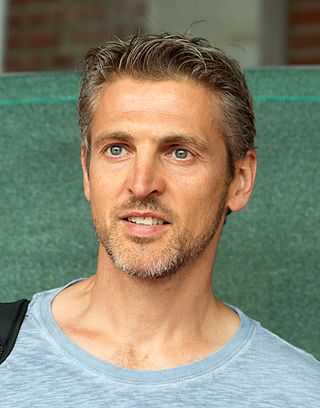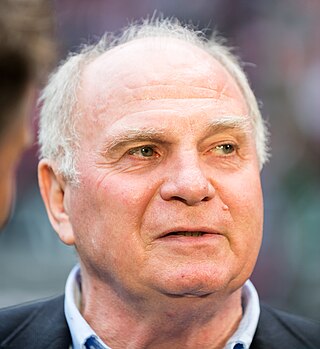Related Research Articles

Fußball-Club Bayern München e. V., commonly known as Bayern Munich, FC Bayern or simply Bayern, is a German professional sports club based in Munich, Bavaria. They are most known for their men's professional football team, who play in the Bundesliga, the top tier of the German football league system. Bayern are the most successful club in German football and are among the world's most decorated, having won a record 33 national titles, including eleven consecutive titles from 2013 to 2023 and a record 20 national cups, alongside numerous European titles.

Allianz Arena is a football stadium in Munich, Bavaria, Germany, with a 70,000 seating capacity for international matches and 75,000 for domestic matches. Widely known for its exterior of inflated ETFE plastic panels, it is the first stadium in the world with a full colour changing exterior. Located at Werner-Heisenberg-Allee 25 at the northern edge of Munich's Schwabing-Freimann borough on the Fröttmaning Heath, it is the second-largest stadium in Germany behind the Westfalenstadion in Dortmund.

Philipp Lahm is a German former professional footballer who played as a full-back. Considered by many to be one of the greatest full-backs of all time, Lahm was the longtime captain of Bayern Munich, having led them to numerous honours including the 2013 UEFA Champions League as part of the Treble.

Hans-Jörg Butt, often simply called Jörg Butt, is a German former footballer who played as a goalkeeper.

Franck Henry Pierre Ribéry is a French former professional footballer who primarily played as a winger, preferably on the left side, and was known for his pace, energy, skill, and precise passing. He is regarded as one of the best players of his generation and one of the greatest wingers in the history of the sport.

Ulrich "Uli" Hoeneß is a German football executive and former professional player who played as a forward. He played for West Germany at one World Cup and two European Championships, winning one tournament of each competition. During his playing career, he was mainly associated with Bayern Munich, where he won three Bundesliga titles and three European Cups.

Hans-Dieter "Hansi" Flick is a German professional football manager and former player who is the manager of La Liga club Barcelona. Flick played for SV Sandhausen, Bayern Munich, and 1. FC Köln during his career as a footballer. He began his managerial career as player-manager of fourth-division club Victoria Bammental. In 2000, he became manager of fellow fourth-division side 1899 Hoffenheim, leading the team to promotion to the Regionalliga Süd before leaving in 2005. From 2006 to 2014, Flick was the assistant coach of the German national team under Joachim Löw, contributing to their victory at the 2014 FIFA World Cup. He subsequently served as the sporting director of the German Football Association (DFB) from 2014 to 2017.

Manuel Peter Neuer is a German professional footballer who plays as a goalkeeper for and captains Bundesliga club Bayern Munich. Widely regarded as one of the greatest and most influential goalkeepers in the history of the sport, Neuer has been described as a "sweeper-keeper" because of his playing style and speed when rushing off his line to anticipate opponents, going out of the penalty area. He was named the best goalkeeper of the decade from 2011 to 2020 by IFFHS.

The 1975 European Cup final was a football match between Bayern Munich of West Germany and Leeds United of England, played on 28 May 1975 at the Parc des Princes in Paris. It was the final match of the 1974–75 season of Europe's premier cup competition, the European Cup. Bayern Munich were appearing in their second final; they had won the previous season's competition, beating Spanish team Atlético Madrid 4–0 in a replay after the first match finished 1–1. Leeds were appearing in their first final.

Sven Ulreich is a German professional footballer who plays as a goalkeeper for Bundesliga club Bayern Munich.

Jean-Eric Maxim Choupo-Moting is a professional footballer who plays as a forward for Major League Soccer club New York Red Bulls. Born in Germany, he plays for the Cameroon national team.

Thomas Müller is a German professional footballer who plays for Bundesliga club Bayern Munich. He plays as an attacking midfielder or a second striker. Widely regarded as one of the greatest players of his generation, Müller has been praised for his positioning, finishing, playmaking, work-rate, and consistency in both scoring and creating goals.

Thiago Alcântara do Nascimento, known as Thiago Alcântara or mononymously as Thiago, is a former professional footballer who played as a midfielder.

Mario Götze is a German professional footballer who plays for Bundesliga club Eintracht Frankfurt and the Germany national team. Although his favoured position is that of an attacking or central playmaker, Götze has also played as a winger or false nine.

Bouna Junior Sarr is a professional footballer who plays as a right back and winger and is currently a free agent. Born in France, he plays for the Senegal national team.

Serge David Gnabry is a German professional footballer who plays as a forward for the Bundesliga club Bayern Munich and the Germany national team.

Kingsley Junior Coman is a French professional footballer who plays as a winger for Bundesliga club Bayern Munich and the France national team.

Julian Wesley Green is an American professional soccer player who plays as a midfielder for 2. Bundesliga club Greuther Fürth.

Alexander Nübel is a German professional footballer who plays as a goalkeeper for Bundesliga club VfB Stuttgart, on loan from Bayern Munich. He also plays for the Germany national team.

Jamal Musiala is a German professional footballer who plays as an attacking midfielder and winger for Bundesliga club Bayern Munich and the Germany national team. Widely regarded as one of the best players in the world, Musiala is known for his passing and technical skills, and is nicknamed "Bambi" for his close-control dribbling. Musiala has represented Germany at UEFA Euro 2020, the 2022 FIFA World Cup, and Euro 2024. He was the joint winner of Euro 2024's Golden Boot.
References
- ↑ "Kupferschmidt, Peter". Kicker (in German). Archived from the original on 4 February 2016. Retrieved 1 April 2012.
- ↑ "Happy 80th birthday Peter Kupferschmidt!". fcbayern.com. FC Bayern München. 2 March 2022. Retrieved 23 January 2025.